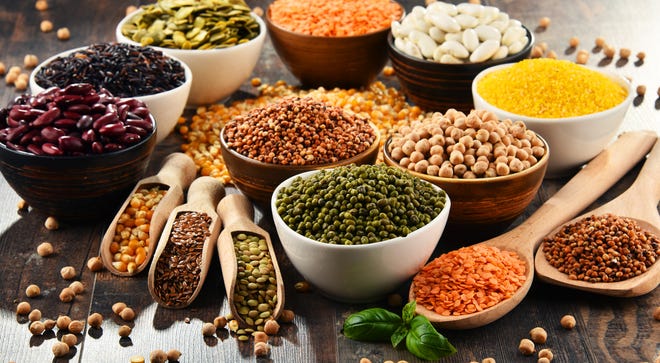
Q: Should I become vegetarian?
A: Plant-based eating is a dietary lifestyle that focuses on eating foods primarily derived from plants, such as fruits, vegetables, whole grains, legumes, nuts and seeds.
Its growing popularity is due to its numerous benefits for health, humans and the environment.
Plant-based diets exclude or minimize the consumption of animal products, including meat, poultry, seafood, dairy, and eggs.
Let’s jump straight into this leafy topic!
Previous One Senior Place columns:
The milestone of the century:There is an increasing chance that you will live to be 100 years old. Here’s how to plan
Options exist:Having pain as you age doesn’t mean you need to take medication
Alphabet soup:Breaking down the A’s, B’s, C’s and D’s of 2023 Medicare Open Enrollment
Food styles
There are different variations of the plant-based diet, ranging from vegetarian to vegan diets.
Vegetarian diets exclude meat but may include dairy and eggs, while vegan diets exclude all animal products.
Some people also follow a “flexitarian” approach, consuming primarily plant-based foods but occasionally including small amounts of animal products.
Health Benefits
Study after study confirms that a plant-based diet can reduce the risk of chronic diseases, such as heart disease, high blood pressure, type 2 diabetes, and certain types of cancer.
For what? Because plant-based foods are generally low in saturated fat, cholesterol and calories, and high in fiber, vitamins, minerals and antioxidants.
Most plant-based diets are naturally low in salt and work well for people with high blood pressure.
Plant-based dietary approaches can also be tailored to specific health concerns.
For example, a low-carb version for diabetics includes healthy fruit choices that are naturally lower in sugar. But be careful: Some plant foods can also be highly processed and high in sugar, fat and sodium.
You will find lots of them in the snack section!
Just start!
Have you ever tried an Impossible Burger?
Incorporating plant-based meals into your diet can be as simple as replacing animal products with plant-based alternatives or trying new recipes with plant-based ingredients.
Is your full plate mostly brown and beige?
Dietitians recommend that you “eat the rainbow” daily to enjoy the many health benefits of colorful fruits and vegetables.
The environment
Plant-based foods – such as fruits and vegetables, whole grains, beans, peas, nuts and lentils – generally use much less energy, land and water and have lower gas intensities. greenhouse effect lower than those of foods of animal origin.
Climate change, water scarcity and dwindling natural resources have led many people to re-examine their relationship with meat and dairy.
The last word
When adopting a plant-based lifestyle, it’s important to make sure your nutritional needs are met.
Consulting a dietitian or healthcare professional can help ensure you eat a balanced, nutritious plant-based diet, especially if you have a health condition.
There really is no downside to eating a healthy plant-based diet and limiting animal products.
Your doctor, the planet and most likely your wallet will thank you!
One Senior Place is a resource marketplace and provider of information, advice, care and on-site services for seniors and their families. The questions in this column are answered by professionals in nursing, social work, care management and home care. Send your questions toAskOSP@OneSeniorPlace.comcall 321-751-6771 or visit One Senior Place, The Experts in Aging.
Brenda Lyle is a Certified Care Manager and Certified Dementia Practitioner at One Senior Place, Greater Orlando.
